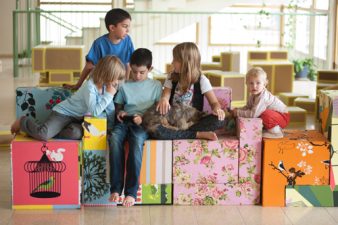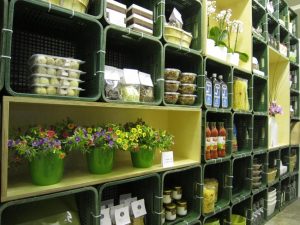 Industrial designer Michael Tsinovsky brought together Israel’s many local styles in his ‘asli’ furniture design.
Industrial designer Michael Tsinovsky brought together Israel’s many local styles in his ‘asli’ furniture design.
When it comes to consumerism, local is almost always better for the environment and for the local economy. Local is better when you’re buying produce at the farmer’s market, when you’re supporting local artisans and craftsmen, and when you’re purchasing local design. But what do you do if you come from a ‘melting pot’ country like Israel, where there are multiple forms of local design? Industrial designer Michael Tsinovsky’s solution, presented in the ‘asli’ furniture line above, was to combine them all in a hybrid of various techniques, styles, and functions and create a coexistence of local.
 The word ‘asli’ means genuine and pure-bred in Arabic, and is used here to signify a return to local aesthetic roots.
The word ‘asli’ means genuine and pure-bred in Arabic, and is used here to signify a return to local aesthetic roots.
In explaining his project further, Tsinovsky explained that his ‘asli’ line was representative of “a young country without a long tradition of arts & crafts and industrial design, that tries to be European in the center of the Middle East. This study case was designed through a glance at the local making cultures, from Arabic carpets and Arabesques, through the German carpenters that immigrated in the 50s and up to the biggest industry in the country ‘Keter Plast’ – plastic injected furniture, through the cultural mix between the people that gathered from all around the Diaspora and formed the ‘melting pot’ of the Israeli society.”
 This idea is perhaps best demonstrated in the chair above, where German carpentry is used to create Arabesque ornament, or in the stool above which has a similar play on techniques.
This idea is perhaps best demonstrated in the chair above, where German carpentry is used to create Arabesque ornament, or in the stool above which has a similar play on techniques.
Tsinovsky’s furniture was recently exhibited at the Thinking Hands exhibition in Milan of work by designers from the Bezalel Academy of Arts and Design, alongside Galit Begas’ plastic bag shoes and Nitsan Debbi’s glass-blown PET plastic bottles.
Read more about locally-focused designers:
Zolaykha Sherzad Resurrects Traditional Afghan Crafts via Modern Fashion Design
Guy Lougashi Weaves Together Baskets and People with Recycled Paper
Interview with Egyptian Eco-Fashion Designer Nadia Nour




Comments are closed.